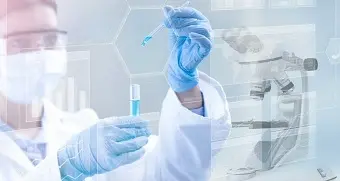Digital Biomanufacturing Market: A New Horizon in Biotechnology
04 Sep 2023 • by Natalie Aster

The biomanufacturing landscape has undergone significant changes over the years, driven by technological advancements and a growing understanding of biological systems. However, a revolutionary change is brewing, encapsulated in the term "Digital Biomanufacturing." With a harmonious integration of big data, artificial intelligence (AI), and advanced robotics in traditional biomanufacturing processes, digital biomanufacturing is poised to change the dynamics of the biotech industry.
What is Digital Biomanufacturing?
Digital biomanufacturing is the amalgamation of biological manufacturing processes with digital technologies like AI, machine learning, and data analytics. It incorporates elements such as sensor networks, automation, and predictive modeling to optimize and enhance the production of biological products. This seamless integration allows for real-time monitoring, predictive analytics, and self-correction within the manufacturing workflow, minimizing errors and improving efficiency.
Historical Background of the Digital Biomanufacturing Industry
The journey of digital biomanufacturing is a testament to technological evolution and cross-disciplinary collaboration. Understanding its historical background not only offers a glimpse into its transformative nature but also showcases the exciting possibilities that lie ahead. As the digital biomanufacturing market continues to grow, its historical roots will remain a compelling story of innovation and progress.
Early Milestones in Biomanufacturing
Before delving into the digital realm, it's essential to recognize the pivotal moments that shaped traditional biomanufacturing. Emerging prominently in the mid-20th century, biomanufacturing initially focused on the standardized production of antibiotics like penicillin. Labor-intensive and reliant on rudimentary technology, the early phase was nonetheless crucial for setting the groundwork for future innovations.
The Dawn of Computerization
Fast-forward to the late 20th century, and you'll find the introduction of computer systems into biomanufacturing environments. Though limited in scope and application, the use of computers signaled a paradigm shift – heralding the potential for automation and data-driven processes.
Emergence of Bioinformatics
The early 2000s were marked by the advent of bioinformatics, bridging the gap between biology and information technology. This integration allowed for more in-depth research and understanding of complex biological systems, laying the foundational stones for what would later become digital biomanufacturing.
Industry 4.0: The Turning Point
Arguably, the most significant catalyst was the Industry 4.0 movement, which surged in the 2010s. This era was characterized by the seamless integration of digital technologies like the Internet of Things (IoT), Big Data, and machine learning into manufacturing processes, including biomanufacturing. This watershed moment marked the birth of the digital biomanufacturing market.
The Digital Biomanufacturing Era
The modern age of digital biomanufacturing is a harmonious blend of AI-driven analytics, real-time monitoring, and automated control systems. These innovations have led to unprecedented levels of precision, efficiency, and scalability, positioning digital biomanufacturing as the future of biotech manufacturing.
Navigating the Digital Biomanufacturing Market: Current Trends and Future Prospects
The sector, once characterized by manual processes and limited technology, has evolved into a high-tech, data-driven field. Digital biomanufacturing combines the prowess of AI, IoT, big data analytics, and machine learning to optimize and streamline biomanufacturing processes. As of 2023, the market is experiencing a surge in investments from both public and private sectors and is poised for significant growth within the next decade.
Key Factors Driving the Digital Biomanufacturing Market
Robust Technological Progress
The rapid growth and integration of cutting-edge technologies like AI, machine learning, and data analytics tools have provided a necessary backbone for the digital biomanufacturing sector development. Advanced algorithms can analyze vast sets of data to optimize variables, such as temperature, pH levels, and nutrient supply, in real time. Real-time analytics and predictive algorithms are transforming not just the speed but also the quality of biomanufactured products.
Soaring Trend towards Customization
The need for personalized medicines and custom bioproducts is pushing the industry toward more flexible and adaptable manufacturing systems. Digital biomanufacturing is emerging as the go-to solution for these needs.
Rising Demand for Precision
As biomanufactured products like pharmaceuticals, biofuels, and biomaterials become increasingly complex, the demand for precision and efficiency has skyrocketed. Digital biomanufacturing offers a solution by providing precise control and real-time adjustments.
Regulatory Support
Worldwide, regulatory bodies have started acknowledging the value and potential of digital biomanufacturing, leading to the introduction of regulatory frameworks that encourage innovation and provide financial incentives for the adoption of digital technologies in biomanufacturing.
Challenges and Risks
Despite the enormous potential, the sector faces challenges such as data security and privacy, interoperability among various technologies, and the need for skilled personnel. High initial investment costs also pose a barrier for smaller organizations.
What's Next? Future Outlook
As technology continues to evolve, the adoption of digital biomanufacturing will likely become more widespread. Advanced sensor technologies will offer even more in-depth real-time monitoring capabilities. Its capabilities may extend beyond current applications, potentially revolutionizing sectors like personalized medicine, agriculture, and environmental sustainability. With improvements in IoT, remote monitoring and control of biomanufacturing processes are likely to become mainstream. Besides, as awareness of climate change grows, biomanufacturing processes are expected to become more eco-friendly.
Final Thoughts
Today, digital biomanufacturing is not just a buzzword, it represents a paradigm shift in how we approach biomanufacturing. By fusing the power of digital technologies with biological manufacturing, this emerging market holds the promise of more efficient, precise, and flexible production processes. As we navigate through the challenges and complexities, the digital biomanufacturing market is undoubtedly a space to watch closely for anyone interested in the future of biotechnology.
Product Details:
Published: August 2023
Pages: 119
All topical research reports featuring the biomanufacturing market available at MarketPublishers.com can be found on this page.
CONTACTS
The Market Publishers, Ltd.
Natalie Aster
Tel: +357 96 030922
Fax: +44 207 900 3970
[email protected]
MarketPublishers.com
Analytics & News
